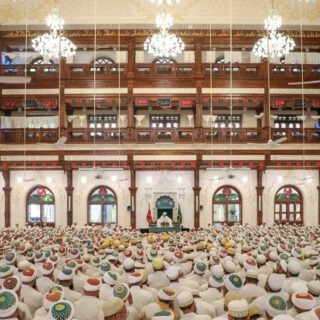4th ShehrAllah, 1441 H
The importance of Surah al-Ikhlas is seen in the fact that when constructing Raudat Tahera, Syedna Mohammed Burhanuddin RA embedded this surah and Surah al-Fateha entirely in precious stones. Maulana Salman al-Farsi RA narrates that Rasul Allah SA had stated that Surah al-Ikhlas symbolizes Amirul Mumineen Maulana Ali AS. He then explained that a person who recites Sura al-Ikhlas once, receives the divine reward of reciting one part of the Quran, the one who recites it twice receives two parts and the one reciting it thrice reaps the divine reward of having completed the entire Quran. Likewise, the faith of a person who in his heart has the mohabbat of Maulana Ali AS, praises him with his tongue and aids him with his hands is complete.
In namaz along with Sura al-Hamd another surah is recited. Generally, if one starts reciting a surah he is permitted to stop it and begin another surah as long as he has not reached its half. If he has reached half of the surah then he should complete it. However, if one begins reciting Surah al-Ikhlas then he should complete it regardless of how much of it has been recited.
The one who recites Surah al-Iklhas ten times every morning seated upon his masalla prior to sunrise will remain free of sin that day no matter how much he is tempted.
Today’s bayan focused on three aspects pertaining to the tilawat and hifz of al-Quran:
- The importance of tilawat and hifz
- The efforts made by Awliya Allah AS in this regard
- How we can better our tilawat and hifz.
The importance of doing tilawat and hifz of the Quran in revealed by Rasul Allah’s ‑ hadith mubarak:
I am leaving amongst you two priceless entities: al-Quran and my descendants (Aimmat Tahereen AS and Duat Mutlaqeen AS)
Therefore to truly follow the tenets of the sharia laid down by Nabi Mohammed SA one is required to adhere to both.
This importance is also brought out by the firman to recite Quran Majid during these difficult times for it has been said, ‘Quran is the cure’. Likewise, it has also been stated, ‘there is no impoverishment for the one who recites the Quran’. In addition, Maulana Ali AS stated to Kumail b. Ziyad that ‘Knowledge protects you, while you protect your wealth’. The Quran is the fountainhead of all learning and protects the one who recites and memorizes it both in this world and the next.
Secondly, Awliya Allah AS have shown Mumineen multiple ways that ease the process of tilawat and hifz. Maulana Ali AS came before Nabi Mohammed SA and expressed the difficulty he was facing in memorizing the Quran. Rasul Allah SA showed him a dua to recite prior to memorization. Therefore the first step to take when one wishes to memorize the Quran is to seek Maula’s TUS dua. Likewise, it is customary that when the children of Mumineen are of age to being reciting from the Quran, they are brought before Maula TUS who commences the recitation for them, and sets them on the pathway towards recitation and memorization of the Quran.
Thirdly, three deeds enhance one’s memory: reciting al-Quran, brushing one’s teeth and doing rozah, all three of which are done in ShehrAllah.
Rasul Allah SA states, ‘four traits are obligatory upon all the wise and discerning of my ummah: (1) to properly listen to knowledge, (2) to protect it, (3) to act in accordance with it, and (4) to disseminate it.
In order to master the art of recitation and accurately memorize the Quran one is required to attentively listen to recitations so that he may grasp correct pronunciations and the rules of recitation. Likewise, to ensure that what he has memorized becomes part of his long-term memory one should regularly revise what he has memorized. Acting in accordance with what he has memorized can mean to understand the meanings of the aayats he has learnt and following the values upheld by the Quran. Dissemination in this context can refer to facilitating someone else in their memorization of the Quran.








